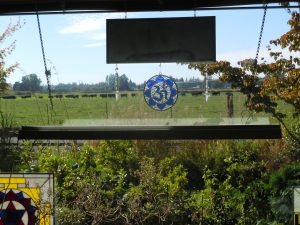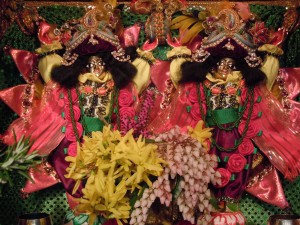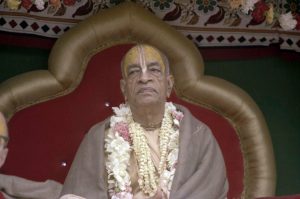Dec 21 1970 Surat conversations
Prabhupāda: No. They should make the citizens so nicely developed in their Kṛṣṇa consciousness that they should be self-dependent, self-satisfied. That is the ideal of civilization.
Yadubara: But America is so far from that.
Prabhupāda: Therefore it is not advancement, although they are very much proud of advancement. This is not sign of advancement. According to Bhagavad-gītā it is said, yasmin sthite guruṇāpi duḥkhena na vicālyate: [Bg. 6.20-23] “If one is situated in such a position that even in the greatest, gravest type of dangerous position, he is not agitated, he is not agitated, that is the real happiness.” Yasmin sthite guruṇāpi duḥkhena na vicālyate. These are the words, yasmin sthite: “Situated in such a position that although he is facing greatest danger, he is not agitated.” There is one instance. Not very long ago, say, about two hundred years ago there was a big zamindar. He was known as king in Krishnanagar. So he was charitably disposed. He went to a brāhmaṇa and asked him—he was a great learned scholar—”Can I help you any way?” And the pandit replied, “No. I don’t require your help. I am quite satisfied.” “How you are satisfied?” “Oh, my, these students, they bring some rice. So my wife boils that, and I have got this tamarind tree. I take some leaves and prepare some juice out of it. That is sufficient.” So he was satisfied. That’s all. But he was a learned scholar. Similarly, Canakya Pandit… You have perhaps heard. He was the greatest politician. He was prime minister of India. He was living in a cottage and just giving instruction. So that is India’s Vedic civilization. Everyone is satisfied, self-sufficient. And now in your country, oh, you have to attend office fifty miles off. And because you have to take this trouble, Kṛṣṇa has provided with car. You are thinking, “I am advanced.” You don’t think that “Although I have got car, I have to go fifty miles off from my home.” This is illusion. You are thinking, “I am advanced. I am happy. I have got this car.” This is illusion. Yes. Gaurasundara was going to maintain, and he drives fifty miles off, Honolulu. The poor fellow had to rise early in the morning. You see? And so much haste.(?) Therefore: “Gaurasundara, you better give up this job. Just depend on Kṛṣṇa.” So he has given up. What is this? Fifty miles going by motorcycle or motor car, how much tedious it is. But still, they are satisfied that “We are advanced.” And because they have many cars, therefore in your country always there is that (makes traffic noise), “sonh, sonh, sonh, sonh, sonh, sonh, sonh, sonh,” wherever I go.
Revatinandana: And more problems come after that.
Prabhupāda: Simply, wherever you go, (makes traffic noise) “sonh, sonh, sonh, sonh,” and “gonh, gonh, gonh, gonh, gonh.” Up in the sky, “gonh, gonh, gonh, gonh,” and in the street, “sonh, sonh…” And then, when digging, “gut-gut-gut-gut-gut-gut-gut-gut-gut!” (laughter) Is it not? Don’t you feel botheration. But they are thinking, “Oh, America is very much advanced in machine.” And when there is that garbage tank? “Ghon-ghon-ghon-ghon-ghon-ghon-ghon-ghon-ghon!” (laughter) So many sounds are going on, always. Eh? Of course, you have got very nice city, nice roads everywhere. But this trouble… You have created so many troubles. And there are news that one lady was a patient. She became mad for the sounds. And I think they are thinking very seriously how to stop all these sounds. Is it not?
Śyāmasundara: Especially they have these airplanes now.
Prabhupāda: Oh.
Śyāmasundara: They make such a tremendous sound that they break windows and everything else.
Prabhupāda: Now we are with Sambhu in Bombay. As soon as the aeroplane would come on top of the house it is just like thunderbolt. Yes. At least I was feeling like that. Vajrapa. [thunderbolt] You see? So this is called illusion. We are creating a civilization which is so much painful, but we are thinking that we are advanced. This is illusion. We are creating simply problems, and still, we are thinking that we are advanced. And Bhāgavata says that there is no problem. Tasyaiva hetoḥ prayateta kovido na labhyate yad bhramatām upary adhaḥ [SB 1.5.18]. You simply try for Kṛṣṇa consciousness. And then how I shall live? That, the answer, is tal labhyate duḥkhavad anyataḥ sukham. Just like you don’t aspire for miseries, but it comes upon you, it is forced upon you, similarly, happiness also will be forced upon you, whatever you are destined to receive. So don’t try for happiness or discarding distress. That will go on. You simply try for Kṛṣṇa consciousness, which, without your trying, it will never be fulfilled. You have to voluntarily try for Kṛṣṇa consciousness, revive it. Therefore Kṛṣṇa says, sarva–dharmān parityajya mām ekaṁ śaraṇaṁ vraja [Bg. 18.66]. You do it—because you have to do it. Kṛṣṇa can force you to become Kṛṣṇa conscious. But He doesn’t do that. He doesn’t interfere with your independence. He says, “Do it.” Therefore you have to try for it, not for other things. Other things, already there are.
Some Conclusions--Another nice conversation with Prabhupada about kali yuga and all the tremendous noises it produces from its machines. Some people can understand and appreciate these comments about noise, but I suspect most are not in the least bothered or even conscious about the constant bombardment to their auditory system of machine noise. It is not until one moves OUT of these cities and lives in the countryside, where there is practically no noise that he or she can then appreciate what it means to have peaceful and noiseless living.
So what is the solution just to this problem?
April 25 1977 Bombay
My, this farming program, theoretically there is no comparison. But practically people are accustomed in different way. To bring them to the program it will take some time. Otherwise my program is assured happiness, happiness assurance, if they get… Have your own food grown. Keep cows. Have your own crops. Chant Hare Kṛṣṇa.
Tamāla Kṛṣṇa: That goes for all over the world.
Prabhupāda: Don’t go to the city. That is my determination. The hellish city. In city nobody has got the opportunity for living in such comfortable place. It is all Kṛṣṇa’s mercy that we have got. Otherwise if you go to the Bombay city, even here, these pigeon holes, three small rooms… It is not expected that everyone will be able to live in such palatial building. That is not possible. Even they have no bathroom in Bombay. In the room, in the corner, there is a tap, and you have to go to the public well, latrine. This is the system. So whole family will take advantage of the corner tap and then have to go to public latrine. There is no bathroom.
Tamāla Kṛṣṇa: No sewer system?
Prabhupāda: No, sewer system. [break] …each toilet for fifty men. They are in line in the same building. One after another you get chance. You have got dysentery, then it is… Then you…
►740524r2.rom Conversations … Yes, naturally. If this man is fed up with this industry, he can go back to village and produce his own food. But he is attached to this industrial activity because he is thinking that “We are getting more money for wine and woman and meat. Let me enjoy.” That is the perfect, imp… But if he chants Hare Krsna maha-mantra, his consciousness will be purified and he will be made not interested this kind of work. He will go back to village and produce food.
Final conclusion-if one is already chanting Hare Krsna mantra yet still living in the city, it could mean he or she is still making some serious offenses to this chanting Look at all 10 of these offenses and see where am I getting stuck up on this process? Maintaining material attachments? inattentive chanting? etc….
Hare Krsna
damaghosa das
below-looking out our temple room window-lots of cows rambling around back to their barn

and if you turn around from that same picture window, one will see some of the Deities at sunset yesterday evening–Thank you Srila Prabhupada for giving us this wonderful opportunity to live in the way you want, and to try to give it to others.




